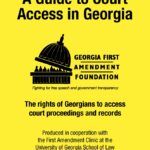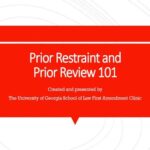Georgia’s Open Records Act and Open Meetings Act respectively codify the presumption that public records should be made available for public inspection without delay and that government agencies must hold the meetings of their governing bodies open for public observation.
Keep ReadingHigh school conduct agreements: Do they conflict with students’ speech rights?
Almost every public and private high school has a code of conduct they require students to follow.
Keep ReadingClinic and Georgia First Amendment Foundation publish guide to accessing court records and proceedings
The First Amendment Clinic has collaborated with the Georgia First Amendment Foundation to create a first-of-its-kind guide to accessing state and federal court records and proceedings in Georgia.
Keep ReadingNew Voices Georgia – Protecting high school press freedoms
High school journalists across the country have long provided news reporting, political and social commentary, and valuable perspective on issues of public concern to their readership.
Keep ReadingPrior review & prior restraint in school-sponsored media
Prior restraint is a type of censorship where speech or expression is stopped before it occurs.
Keep ReadingWhen government employees are not allowed to speak to the media
Freedom of speech and freedom of the press are both abridged when government agencies prohibit their employees from speaking with the media on matters of public import.
Keep ReadingOnline censorship: public officials blocking citizens on social media
A critical mass of courts — including the three Circuit Court of Appeals to have so far addressed the issue — find that it constitutes unconstitutional viewpoint discrimination in violation of the First Amendment for a public official who operates an interactive social media account in their capacity as a state actor to deny individuals access to that account based on dislike of or disagreement with their speech.
Keep ReadingProtection of news sources in Georgia & the 11th Circuit
Georgia’s Shield Law, most recently codified at O.C.G.A. § 24-5-508, and the qualified reporters’ privilege recognized by the 11th Circuit U.S. Court of Appeals (covering Georgia, Alabama and Florida) both protect journalists, in many instances, from being compelled as a third-party witness or from having to produce their work product as evidence in a legal proceeding as to which the journalist is not a party.
Keep ReadingCitizens’ right to record the police
Under the First Amendment, citizens have the right to record the police performing their duties in public. This right is essential to informing the public about police activity and holding government accountable for the actions of law enforcement.
Keep Reading“Know Your Rights” for journalists reporting on protests
In June 2020, the First Amendment Clinic created an information sheet for journalists on how to prepare, how to respond, and what to expect when police detain or arrest you in the course of newsgathering.
Keep Reading








